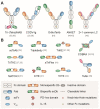When three is not a crowd: trispecific antibodies for enhanced cancer immunotherapy
- PMID: 36793863
- PMCID: PMC9925307
- DOI: 10.7150/thno.81494
When three is not a crowd: trispecific antibodies for enhanced cancer immunotherapy
Abstract
Despite the clinical success of the first bispecific antibody approved by the FDA against B cell malignancies (blinatumomab), many obstacles remain such as dosing, treatment resistance, and modest efficacy in solid tumors. To overcome these limitations, considerable efforts have been dedicated to the development of multispecific antibodies, opening up new avenues to address both the complex biology of cancer and the onset of anti-tumoral immune responses. Simultaneous targeting of two tumor-associated antigens is presumed to enhance cancer cell selectivity and reduce immune escape. Co-engagement of CD3, along with agonists of co-stimulatory molecules or antagonists of co-inhibitory immune checkpoint receptors in a single molecule, may revert T cell exhaustion. Similarly, targeting of two activating receptors in NK cells may improve their cytotoxic potency. And these are only examples of the potential of antibody-based molecular entities engaging three (or more) relevant targets. From the perspective of health care costs, multispecific antibodies are appealing, since a similar (or superior) therapeutic effect could be obtained with a single therapeutic agent as with a combination of different monoclonal antibodies. Despite challenges in production, multispecific antibodies are endowed with unprecedented properties, which may render them more potent biologics for cancer therapy.
Keywords: NK cell engager; T cell engager; antibody engineering; cancer immunotherapy; trispecific antibody.
© The author(s).
Conflict of interest statement
Competing Interests: The authors have declared that no competing interest exists.
Figures
References
-
- Mullard A. FDA approves 100th monoclonal antibody product. Nat Rev Drug Discov. 2021;20:491–5. - PubMed
-
- Labrijn AF, Janmaat ML, Reichert JM, Parren PWHI. Bispecific antibodies: a mechanistic review of the pipeline. Nat Rev Drug Discov. 2019;18:585–608. - PubMed
-
- Nisonoff A, Rivers MM. Recombination of a mixture of univalent antibody fragments of different specificity. Arch Biochem Biophys. 1961;93:460–2. - PubMed
-
- Lindhofer H, Mocikat R, Steipe B, Thierfelder S. Preferential species-restricted heavy/light chain pairing in rat/mouse quadromas. Implications for a single-step purification of bispecific antibodies. J Immunol. 1995;155:219–25. - PubMed
-
- Milstein C, Cuello AC. Hybrid hybridomas and the production of bi-specific monoclonal antibodies. Immunol Today. 1984;5:299–304. - PubMed
Publication types
MeSH terms
Substances
LinkOut - more resources
Full Text Sources
Other Literature Sources
Medical


